Office of Principal Scientific Advisor to GoI
Principal Scientific Adviser to GoI chairs the Second Annual Review Meeting of RuTAG 2.0 Projects held at IIT Guwahati
Posted On:
14 NOV 2025 5:16PM by PIB Delhi
The Principal Scientific Adviser (PSA) to the Government of India, Prof. Ajay Kumar Sood, chaired the second annual review meeting of the Rural Technology Action Group (RuTAG) 2.0, an initiative of the Office of the Principal Scientific Adviser (OPSA). The meeting was held on the 13th and 14th of November 2025, at the Indian Institute of Technology (IIT) Guwahati. Dr. Parvinder Maini, Scientific Secretary, OPSA; and Dr. Rakesh Kaur, Adviser/Scientist ‘G’, OPSA and RuTAG co-ordinator also joined the meeting.
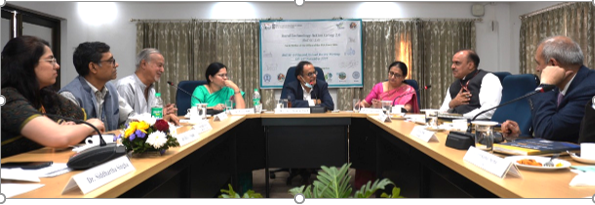
The inaugural session preceding the meeting commenced with a welcome address by Prof. Sashindra Kr. Kakoty, IIT Guwahati, who highlighted the institute’s ongoing initiatives in advancing rural technologies and promoting sustainable livelihoods through innovation in the North-Eastern region. Dr. Kaur briefly outlined the overall progress of RuTAG 2.0 during 2024-25, underlining the achievements across the seven centres and expanding collaborations with the state departments, industries, and community-based organisations for technology adoption. Prof. Devendra Jalihal, Director, IIT Guwahati, Dr. Hafsa Ahmad, Scientist ‘D’, OPSA; and Mr. Dibojit Pathak, Technical Staff, OPSA also attended the session.
In his keynote address, Prof. Sood emphasised the role of science and technology in improving the quality of life in rural India. He stated, “RuTAG connects our research institutions with the needs of rural communities and ensures that scientific knowledge becomes a tool for empowerment. When rural India becomes capable of solving its own challenges through locally developed technologies, it strengthens the foundation of self-reliance.” He further highlighted the importance of maintaining quality, standardisation, and collaboration across RuTAG Centres to ensure that technologies are reliable, scalable, and impactful.
Dr. Parvinder Maini underscored, “RuTAG has shown that when scientific effort is directed at local needs, it can transform rural livelihoods. Our next phase of work must focus on ensuring that every technology developed under RuTAG reaches people in a sustained and meaningful way.” She highlighted the need to strengthen engagement with self-help groups, micro-enterprises, and local innovators for developing viable rural value chains.
Prof. Jalihal highlighted the need for RuTAG 2.0 to prioritise technologies with clear potential for field deployment and measurable impact. He noted that with the programme reaching a stage of maturity, centres must focus on selecting problem statements that address real rural challenges and ensure that solutions move beyond prototypes to meaningful adoption.
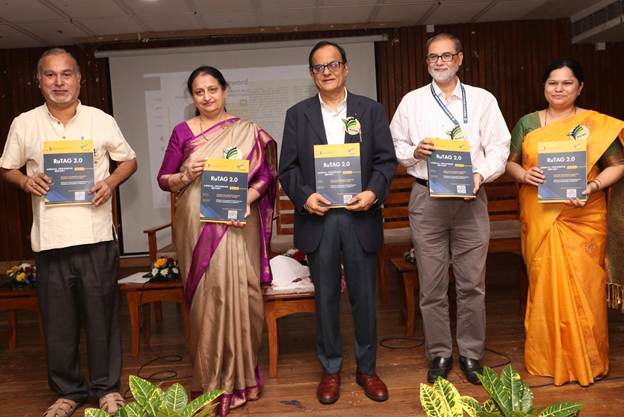
PSA Prof. Sood released the RuTAG 2.0 Annual Progress Report 2024-25 that showcases more than 56 ongoing projects addressing rural challenges in agriculture, animal husbandry, post-harvest management, renewable energy, water purification, and rural crafts, many of which have reached prototype and field-deployment stages. Prof. Sood also inaugurated the Centre for Innovation in Agri & Aqua Voltaics (CIAAV) and the Integrated Facility for Wellness-Product Innovation (IFWPI), IIT Guwahati. The centre aims to promote interdisciplinary research and innovation in agrivoltaics, aquavoltaics, and wellness-product development, strengthening rural entrepreneurship and livelihood creation in the North-Eastern region.
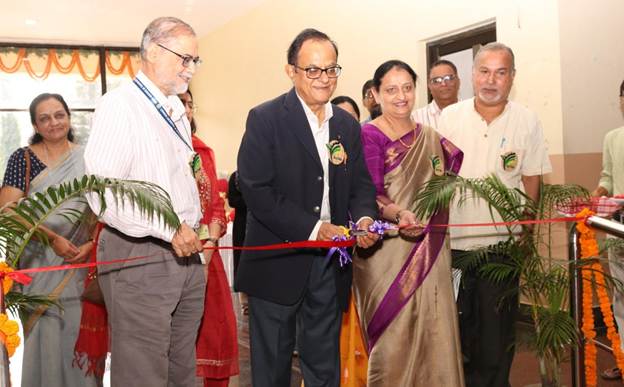
A Grassroots Innovation and Startup Exhibition, featuring technologies and prototypes developed by RuTAG Centres and partner organisations under the RuTAG 2.0 programme, was organised. Drone-based applications developed for rural deployment were also demonstrated at the School of Agro and Rural Technology (SART), IIT Guwahati.
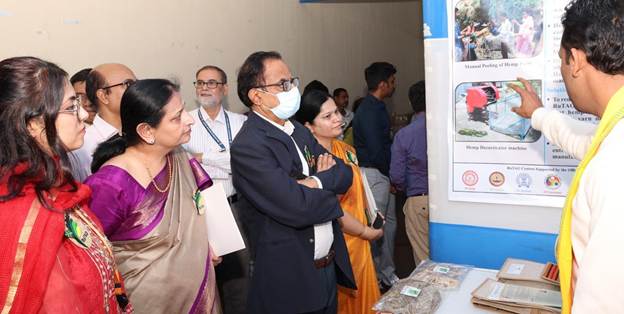
During the review sessions, all seven RuTAG Centres (IIT Guwahati, SKUAST-Kashmir, IIT Delhi, IIT Bombay, IIT Roorkee, ICAR-NAARM Hyderabad, and IIT Madras) presented their annual progress and shared insights from field implementations. Discussions focused on scaling proven technologies, enhancing inter-centre collaboration, and establishing partnerships with government departments, industry, and local communities for wider adoption.
A stakeholders’ meeting was held on the sidelines, with representatives from the Ministry of Development of the North Eastern Region (MDoNER), the Ministry of Micro, Small and Medium Enterprises (MSME), the Government of Uttar Pradesh, the North East Centre for Technology Application and Reach (NECTAR), the Assam Science Technology and Environment Council (ASTEC), the National Bank for Agriculture and Rural Development (NABARD), and the Assam State Rural Livelihoods Mission (ASRLM) taking part.
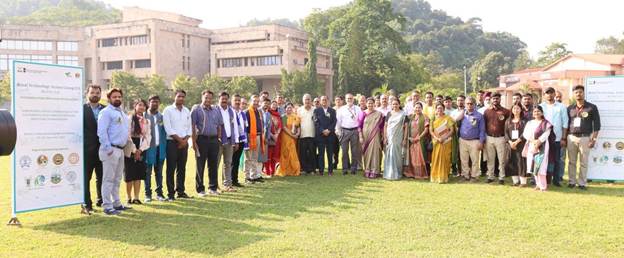
The two-day event concluded with deliberations on the strategic roadmap for RuTAG 2.0 to further advance technology-led rural development through collaborative science, innovation and partnerships.
******
MJPS/ST
(Release ID: 2190083)
Visitor Counter : 1887